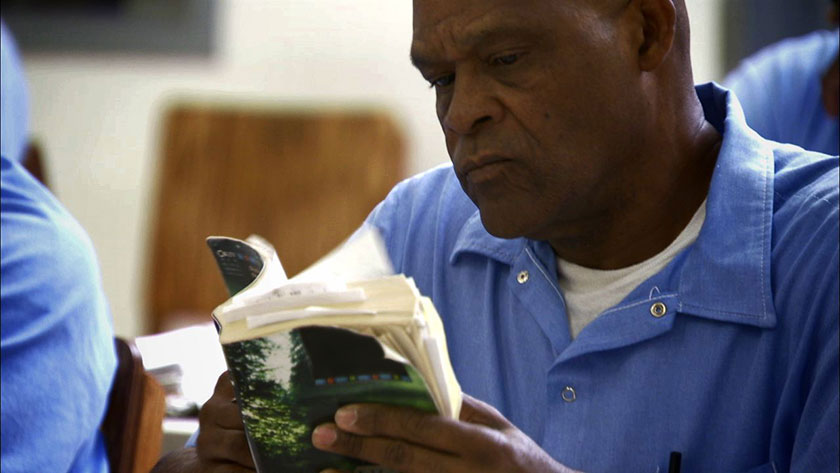Should prisoners be eligible for federal Pell Grants?

Should prisoners be eligible for federal Pell Grants? Some lawmakers believe so, pointing to evidence that the access to education supports restoration.
Such was the case for Dr. Michael Strong, who has seen first-hand how access to education can have a powerful effect on prisoners.
'EDUCATION IS SOMETHING NO ONE CAN TAKE FROM YOU'
"One thing people fail to realize is that you have a lot of talent in the penitentiary, but you also have a lot of people who are illiterate," says Dr. Strong.
Dr. Strong works for the Texas attorney general's office with the Crime Victims' Compensation Program, providing aid and resources to crime victims and their families. He's also a former prisoner who used his time behind bars to earn his doctorate.
"[Other prisoners] used to laugh at me because I was always going down the hallway with books," Dr. Strong recalls. The prisoners would mock him: "What are you going to do? You got a doctor's degree and you've got a life sentence."
"Let me tell you something," Dr. Strong would say to them, "Education is something no one can take from you."
THE HIGHER EDUCATION ACT
Studies have shown that participation in education programs while incarcerated leads to lower recidivism rates, yet very few prisons today offer postsecondary education programs. That wasn't always the case.
In 1965, President Johnson and his administration passed the Higher Education Act. This act created federal Pell Grants, subsidies for students in need of financial help to attend a college or university. The financial aid provided through this act extended to incarcerated individuals.
As a result, education programs expanded throughout the prison system. By 1990, there were 772 prison college programs in more than 1,000 correctional facilities. Although the majority of these prison college programs were funded by this federal subsidy, incarcerated students received less than 1% of the nation’s total spending for Pell Grants.
Still, in 1992, an amendment to the Higher Education Act denied Pell Grant eligibility to prisoners serving life sentences or who were on death row. Two years later, the passage of the Violent Crime Control and Law Enforcement Act denied all incarcerated individuals’ eligibility for federal financial aid.
Postsecondary education programs dropped dramatically across the country with the loss of federal funding, with less than ten programs available nationally. Yet incarceration in the United States thrived. A 2013 study by the RAND Corp. and funded by the Department of Justice revealed that prisoners who participated in education programs were 43 times less likely to return to prison than those who didn’t.
THE SECOND CHANCE PELL EXPERIMENTAL SITES INITIATIVE
In 2016, the Obama administration established the Second Chance Pell Experimental Sites Initiative. The goal of the initiative was to see if expanded financial aid has an impact on the participation of incarcerated adults in educational programs. Out of 200 colleges and universities that applied, 67 were chosen for the initiative. In February 2019, the Department of Education announced the initiative would be renewed for one more year. Currently, more than 10,000 students have received Pell Grant funds from 64 institutions through the Second Chance Pell pilot program.
Today lawmakers are reconsidering the ban on Pell Grants for the incarcerated. The REAL Act was introduced with bipartisan support in both the House and Senate, and the White House has included "supporting returning citizens" among the guiding principles for reauthorizing the Higher Education Act.
"The pilot is a worthwhile initiative, but it barely begins to reap the potential benefits of lower recidivism, lower incarceration rates, and improved tax revenues from the participation of gainfully employed returning citizens in the local economy," writes Heather Rice-Minus, vice president of government relations and church mobilization for Prison Fellowship, in an op-ed co-authored with Shapri Lomaglio. "If Pell eligibility were restored for prisoners, more institutions, including faith-based colleges and universities, would have increased capacity to start or expand prison education programs, and these social benefits would multiply."
"Restoring access to higher education behind bars will create safer prisons and communities; prison education programs are shown to reduce prison violence and recidivism," explains Rice-Minus. "It will also help tap into the God-given potential of men and women who, despite their choices in the past, can make significant future contributions to their families and communities."
A RESTORATIVE APPROACH TO JUSTICE
Prison Fellowship has seen firsthand the positive effects in-prison programming and access to education can have for those incarcerated. To learn more about this issue and Prison Fellowship’s stance, read our resource “Higher Education in Prison”.
DID YOU ENJOY THIS ARTICLE?
Make sure you don' t miss out on any of our helpful articles and incredible transformation stories! Sign up to receive our weekly newsletter, and you' ll get great content delivered directly to your inbox.
Your privacy is safe with us. We will never sell, trade, or share your personal information.